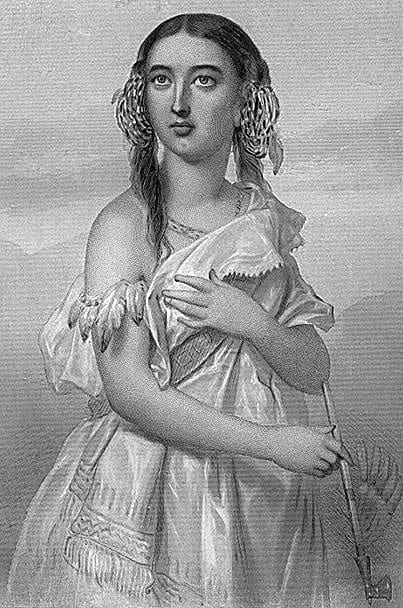Pocahontas: Destroyer of Nations
Perry Lorenz, American Renaissance, September 1996

Pocahontas
Recently, a number of children’s films have been retelling the story of the Indian princess Pocahontas, the English settler Captain John Smith, and the founding of Jamestown in 1607. In many ways, these events mark the beginning of America, and the beginning of the catastrophic loss of a continent for the Indians.
Pocahontas was a liberal. Her theory of permissive immigration as the route to peace was in sharp contrast to that of the braves in her tribe. They, too, favored peace, but the kind that flows from the separation of nations by an ocean of water. They wanted to defend their land by chasing the Europeans into the sea.
Pocahontas believed that men of good will from diverse nations could dwell in peace in the same land. Her vision of a pluralistic society required just one change in the nature of man: that he become indifferent to the survival of his own ethnic group.
The braves had a clearer insight into the nature of man, groups, and land. Borders between ethnic groups, enforced by military strength, determine access to the land. Tribes that successfully defend their borders survive into the future. Nations that practice the Pocahontas policy give their land over to aliens at the expense of their own families. They may experience an exhilarating rush of selfless moral superiority before they are displaced or absorbed.
One can imagine Pocahontas — if she had had our trendy vocabulary — calling the Braves “xenophobes,” “bigots,” and “racists.” The Braves, no doubt, would have called themselves “patriots.”
In this case the Pocahontas policy prevailed. It was followed by three centuries of ethnic violence. The violence finally ended, not because human nature changed, but because the few remaining Indians were pushed into remote regions and were effectively out of contact with the new occupying nation. To their credit, the Braves fought valiantly, but only after allowing the immigrants to get a foothold. By then it was too late.
For the Indians, the next three centuries do not look promising. Indians number only two million out of a population of 260 million and they will probably be absorbed. If so, their language, their culture and their race will become extinct. Perhaps a few of them draw satisfaction from the current wave of immigration that is threatening their old nemesis — the pale face.
The Pocahontas policy buys time for the new immigrants to build their population before challenging the dominant nation. The nature of man and the competition for land ensure that there will be ethnic competition — if not violent, then political, economic, or demographic.
The best chance for ethnic peace is secure borders and self government for every ethnic group or nation. The spirit of Pocahontas — kind heart and liberal pluralism — continues to destroy nations.















